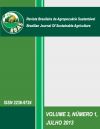MECHANICALLY INJURED BELL PEPPER PLANTS CAUSE CHANGES IN PROTEIN EXPRESSION OF NONINJURED NEIGHBORING PLANTS
DOI:
https://doi.org/10.21206/rbas.v3i1.185Abstract
Proteomics evaluates biological events by analysis of the expression of proteins in cells or tissues under different physiological situations. For plant proteomics, in order to maintain similar cultivation conditions, treated and non-treated plants are generally cultivated under the same environment without considering changes by the treated plants in protein expression of non-treated neighboring plants. The aim of this work was, by proteomics, assess the differential expression of proteins in non-wounded (non-treated) and wounded (treated) leaves of bell pepper (Capsicum annuum L. ‘Magali R’) by mechanical injury, when plants were grown physically nearby or not. At 40 days of cultivation, some plants were wounded by mechanical injury in all expanded leaves (wounds, F), some plants were maintained as non-injured plants, or being grown near to F plants (NFP, 0.15 m ) or being grown away from F (NFL, 10 m). NFP and NFL plant leaves were harvested at 12, 48, and 168 h after injury of F plants, and the NFL and NFP extracts were analyzed by two-dimensional electrophoresis (2-DE). The protein profiles were compared using Image Master and the proteins were identified using mass spectrometry. NFP 12 h extract presented a lower protein concentration; for 48 h and 168 h, the protein was similar for NFL and NFP. For 2-DE, no significant difference was observed between NFP 12 h and NFL 12 h. However, NFP 48 h showed a higher expression of proteins involved in plant defense. For NFP 168 h, an increased expression of proteins involved in normal metabolism was detected. These results indicated that defense responses were developed by NFP plants considering the proximity of non-wounded plants from wounded plants during cultivation, with volatile compounds involvement. In this sense, it should be emphasized the importance of the choice of the growth conditions for the control-treatments, not only for proteomics.Downloads
Downloads
Published
2013-07-01
How to Cite
Patrícia Dias Games, Patrícia Pereira Fontes, Lanna Clicia Carrijo, Marcos Jorge Magalhães Júnior, Paulo Roberto Gomes Pereira, & Maria Cristina Baracat-Pereira. (2013). MECHANICALLY INJURED BELL PEPPER PLANTS CAUSE CHANGES IN PROTEIN EXPRESSION OF NONINJURED NEIGHBORING PLANTS. Brazilian Journal of Sustainable Agriculture, 3(1). https://doi.org/10.21206/rbas.v3i1.185
Issue
Section
Artigos
License
1. Proposta de Política para Periódicos de Acesso Livre
Autores que publicam nesta revista concordam com os seguintes termos:
Autores mantém os direitos autorais e concedem à revista o direito de primeira publicação, com o trabalho simultaneamente licenciado sob a Licença Creative Commons Attribution que permite o compartilhamento do trabalho com reconhecimento da autoria e publicação inicial nesta revista.











